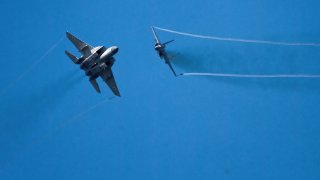Israel’s Unmistakable Escalation Dominance
In the last year—and especially in the last several weeks—Israel has been able to re-establish the superiority it lost on October 7.
In the wake of Iran’s October 1 ballistic missile strike on Israel—the largest such attack in history—there has been a deepening sense of fear within the White House that Israel’s much-anticipated retaliation will instigate a wider regional war. President Joe Biden has repeatedly cautioned Israel, both publicly and privately, against taking “escalatory” measures, proposing that strikes on Iran’s oil fields and nuclear facilities should be off the table. While the nature of Israel’s response is still anybody’s guess, one thing’s for certain: Iran is not interested in a broader war. The administration’s fears reveal a fundamental misunderstanding of the Islamic Republic’s strategic calculus.
Iran knows that it does not have the capabilities to fight a conventional war with either the United States or Israel, which is why it has always favored acting through its proxies. For the last year, the regime has had Hamas, Hezbollah, the Houthis, and Iraqi militias all throw their punches against Israel while safely watching from the sidelines, interjecting with empty threats of direct “retaliation” and “revenge” each time the IDF successfully eliminated a senior commander.
And when Iran finally did respond with a large-scale missile and drone attack in April of 2024, the result was a humiliating failure that inflicted almost no damage on the Jewish State. The regime didn’t even try to avenge the subsequent assassinations of Fuad Shukr in Beirut and Ismail Haniyeh in Tehran in July, despite concerns, once again from the administration, that Israel had created a situation ripe for escalation.
It was only after Hezbollah, Iran’s main line of defense against Israel, began to take a serious beating—starting with the pager attacks on Hezbollah activists and culminating in the assassination of longtime Hezbollah leader Hassan Nasrallah and a ground assault on southern Lebanon—did Iran feel the pressure to respond. Even then, this was only to project strength at a moment when its inaction began to resemble what it actually was: weakness. That, too, proved to be a colossal embarrassment.
If the April and October strikes served as any reminder to the regime, it’s that Israel maintains military dominance in the region. Indeed, since the October attacks, Iran has been urgently seeking support from its Gulf neighbors to try and contain the scale of Israel’s retaliation, publicly insisting they are not interested in a wider war. And it’s why fears of a major escalatory response by Iran are overblown; its prior retaliations, while certainly intended to incur damage, were not meant to invite a significant response from Israel. All any additional strike could do is further expose Iranian incompetence, an existential liability to a regime whose foremost concern is its own survival.
Over the past forty years, Iran has masterminded a network of proxies to do its bidding, providing it considerable influence across the Middle East, which has resulted in regional destabilization. But in the last year—and especially in the last several weeks—Israel has been able to re-establish the superiority it lost on October 7. Hamas is combat ineffective, Hezbollah is incapacitated, and Iran’s barrages were absorbed with near total immunity. Contrary to the administration’s concerns about an all-out regional war, what Israel is experiencing now is escalation dominance. It has proven able to dictate the terms of this conflict through its willingness to take tactical risks. It has now been afforded a historic opportunity to incur serious strategic damage to Iran of the kind it has never seen before. And that means allowing Israel to target the apparatuses that have continued to sustain the regime’s leverage—including missile sites, nuclear research facilities, and oil refineries—all of which Israeli cabinet officials have been weighing. And now, with the elimination of Hamas leader and 10/7 mastermind Yahya Sinwar, Israel’s greatest military victory since the start of the war, the country has never been in a better position to take full advantage of the momentum it has gained.
While the administration’s decision to send a Terminal High Altitude Area Defense missile system (THAAD) to Israel is a positive show of the U.S. commitment to Israel’s security, it should not be a gesture conditional on a more measured response to Iran’s ongoing aggression. A limited strike on Iran might have a short-term deterrence effect. Still, it ultimately won’t rid the region of the problems Iran and its proxies continue to pose for Israel, the United States, and its allies. And while Netanyahu has since stated that Israel will make a final decision based on its own national interests, he cannot afford to act in opposition to the United States. Indeed, despite Israel’s recent show of force, it does not have the operational capacity to effectively target critical infrastructure in Iran or sustain a long-term, multi-front conflict without American support.
As Israel continues to weigh its response, it is worth noting that the administration’s curbs on offensive power are a message that reaches far beyond Iran. Our adversaries are watching. And if President Biden really understood what it takes to avoid escalation, he would let Israel continue to do the job he has been unwilling to do for the last three and a half years: show them what strength looks like.
Sahar Soleimany is a senior research associate at the American Enterprise Institute, where she focuses on U.S. policy in the Middle East. Follow her on X: @ssoleimany.
Image: Luciano Santandreu / Shutterstock.com.

